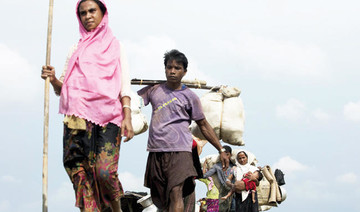SEOUL: Tucked away behind the main avenue of Seoul’s central Itaewon district, the signs along “Muslim Street” — which features the Korean alphabet Hangul and Arabic script side by side — is the first giveaway of the neighborhood’s soul.
A little walk up the street, visitors would then find the Seoul Central Mosque — the country’s first and largest — that for decades has served as a beating heart for South Korea’s minority Muslim community.
“Korean Muslims are one of the smallest minority groups in Korea … In Itaewon, no one thinks I am weird when I tell them I am Muslim, or when I pray at the mosque or dress in Arab clothes. It gives me a sense of tranquility. And it also satisfies a big portion of the loneliness I feel as a Muslim,” Eom Min-a, a 35-year-old government official, told Arab News.
“When I meet friends in Itaewon, or when I pray in the mosque with other Muslims, I feel that I am not alone in this country. That makes me keep wanting to go there.”
In South Korea, Muslims make up only around 0.3 percent of the country’s 51 million population, according to the Korea Muslim Federation. Migrant workers from Muslim countries make up the bulk of the Korean Muslim community, as around 70 percent of them are foreigners.
For Koreans like Eom, being Muslim is often a lonely and alienating experience. She deals with microaggressions from time to time and often feels excluded from the larger society.
But whenever she visits Itaewon, she feels liberated. It is also the place where she meets her Muslim friends — most of whom are foreigners — and eats Arab food.
“When you go to Itaewon, you can see the mosque on top of the neighborhood’s highest hill. You feel a sense of pride,” she said. “I feel liberated and I find a lot of emotional comfort there.”
Though small, the growth of the Muslim community in Korea is often traced back to when the Seoul Central Mosque was built in 1976, with funding from Saudi Arabia.
Since then, Muslims in and around Seoul have visited the mosque in Itaewon especially to get together and celebrate the main holidays in Islam, Eid Al-Adha and Eid Al-Fitr.
“Before my child was born, I would go to the central mosque in Itaewon during Ramadan or Eid and participate in the prayers,” business owner Kim Jin-woo told Arab News.
“From our point of view as Muslims, the neighborhood and the Central Mosque feel like home … In our heart, it is a place like home.”
Kim’s visits to Itaewon are also related to household needs at times, including buying halal or Arab ingredients. From dates to homemade hummus to falafel, the shop Kim goes to carries more Arab products than Korean ones.
“My family also goes to Itaewon to shop for groceries. My wife mostly cooks Moroccan food at home, and the shopping center there has a large assortment of Arab groceries and halal meat,” he said.
Over the years, Seoul’s Muslim neighborhood has grown into a beacon of diversity and peaceful coexistence even for other Itaewon residents, including for 83-year-old Kim C., a non-Muslim who has run a shop in the area for over 40 years.
“I have hired foreign Muslim employees myself. They are genuine people,” Kim told Arab News. “They are no different from my other neighbors.”





























